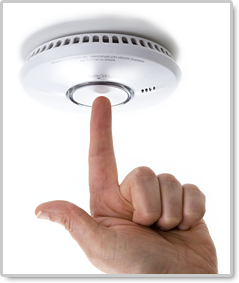Why and How to Clean Your Smoke Detectors

Why?
There are two basic types of smoke detectors: photoelectric, and ionization.
An ionization type smoke alarm uses a small amount of radioactive material to ionize air in the sensing chamber. A photoelectric type smoke alarm, in comparison, consists of a light emitting diode and a light sensitive sensor in the sensing chamber. Photoelectric smoke detectors are designed for detecting smoke where there is smoke but not necessarily flames. Photoelectric smoke detectors are the most widely used type of detector. Ionization type detectors work best for rapidly spreading fires in combustible materials, where there are lots of flames but little smoke. Ionization type detectors are often used in kitchens, since they are less likely to be falsely triggered by cooking fumes.
Regardless of the type of smoke detector you have, it is critical that their sensors be clean so that they can properly respond to changes in the environment in your home. Over time, dust, pollen, pet dander, cooking vapors, smoke, etc. from the air in your home can begin to build up on the sensors in your smoke detectors. This build-up that forms over your sensors acts as an insulator which reduces the performance of these sensors (helpful accessory: dust wipes).
To make sure that your smoke detectors react properly in an emergency, it is critical that they be properly cleaned out.
How?
Once every six months, we recommend that you clean your smoke detectors. Cleaning your smoke detectors involves two activities: 1) vacuuming out the unit; and 2) wiping down the outside vents.
To vacuum out the unit, you should follow your manufacturer’s recommendations for routine cleanings. Typically this will involve removing the face of the unit and then using a soft brush attachment for your vacuum cleaner to gently brush and vacuum the inside of your smoke detector (see types, costs, and reviews of vacuum cleaners).
In addition to vacuuming the inside of your smoke detector, you should also use a clean wipe and mild detergent to remove build-up from the outside of your unit. In particular, you will want to clean the vent openings, to ensure that airflow is not obstructed to the sensor inside the unit.
If you are not sure how to clean your smoke detector, you should at least vacuum the outside of the unit, which will draw air through the vents in the face of the unit.
Summary
We hope you never have a smoke detector go off in your home. But this should NOT be because your smoke detector failed to operate because the sensor was dirty. Hopefully this article has convinced you of the importance of routinely cleaning your smoke detectors, and has helped you understand how to properly clean them.
Related Articles . . .
Home Fireproofing: Prevention; Detection; Action
Keeping your home and family safe from fires involves focusing on three areas: prevention, detection and taking emergency actions in the case of an actual fire. 400,000 homes catch on fire each year.
Choosing the Right Fire Extinguisher
You should definitely have a fire extinguisher in your kitchen, garage, and workshop. This article explains: the different types of fire extinguishers; how to select the right one; and how to properly use them.
7 Things That Can EXPLODE in Your Home!
If your attitude towards home maintenance is I don't want to know about it, unless it will keep my house from blowing up! . . . then you will love this article and video.
Properly Placing Your Carbon Monoxide Detectors
Just having CO detectors in your home is not enough . . . they need to be installed in the correct locations. This article explains where to, and where not to, install your CO detectors to be the most effective.
Cooktop Fires: Critical DO's and DON'Ts
Stove fires can be extremely dangerous and can turn into fireballs if not handled properly. In this article, we describe: 1) what to do, and never do, if you have a stove fire; and 2) how you can prevent them in the first place.
Keeping Your Family Safe This Holiday Season
Hopefully your holidays this year will be wonderful. But the holidays are unfortunately a time of increased accidents and crime. So here are some holiday safety tips to help you protect your home, children, and pets.










